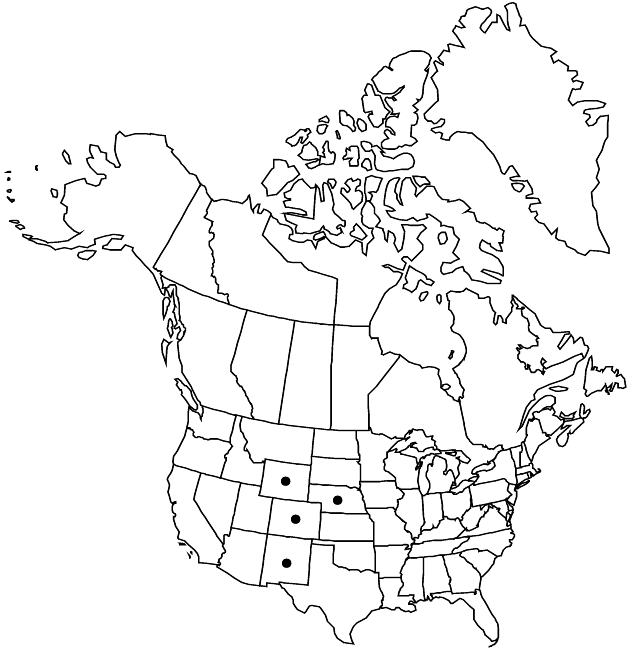Difference between revisions of "Erigeron vetensis"
Bull. Torrey Bot. Club 32: 126. 1905.
FNA>Volume Importer |
imported>Volume Importer |
||
| (5 intermediate revisions by 2 users not shown) | |||
| Line 8: | Line 8: | ||
}} | }} | ||
|common_names=Early blue-top fleabane | |common_names=Early blue-top fleabane | ||
| + | |special_status={{Treatment/ID/Special_status | ||
| + | |code=E | ||
| + | |label=Endemic | ||
| + | }} | ||
|basionyms= | |basionyms= | ||
|synonyms={{Treatment/ID/Synonym | |synonyms={{Treatment/ID/Synonym | ||
|name=Erigeron glandulosus | |name=Erigeron glandulosus | ||
|authority=Porter | |authority=Porter | ||
| + | |rank=species | ||
}} {{Treatment/ID/Synonym | }} {{Treatment/ID/Synonym | ||
|name=Erigeron porteri | |name=Erigeron porteri | ||
|authority=S. F. Blake | |authority=S. F. Blake | ||
| + | |rank=species | ||
}} | }} | ||
|hierarchy=Asteraceae;Asteraceae tribe Astereae;Erigeron;Erigeron vetensis | |hierarchy=Asteraceae;Asteraceae tribe Astereae;Erigeron;Erigeron vetensis | ||
| Line 39: | Line 45: | ||
-->{{#Taxon: | -->{{#Taxon: | ||
name=Erigeron vetensis | name=Erigeron vetensis | ||
| − | |||
|authority=Rydberg | |authority=Rydberg | ||
|rank=species | |rank=species | ||
| Line 53: | Line 58: | ||
|publication title=Bull. Torrey Bot. Club | |publication title=Bull. Torrey Bot. Club | ||
|publication year=1905 | |publication year=1905 | ||
| − | |special status= | + | |special status=Endemic |
| − | |source xml=https:// | + | |source xml=https://bitbucket.org/aafc-mbb/fna-data-curation/src/2e0870ddd59836b60bcf96646a41e87ea5a5943a/coarse_grained_fna_xml/V19-20-21/V20_600.xml |
|tribe=Asteraceae tribe Astereae | |tribe=Asteraceae tribe Astereae | ||
|genus=Erigeron | |genus=Erigeron | ||
Latest revision as of 20:04, 5 November 2020
Perennials, 5–25 cm; taprooted, caudices with relatively short, thick branches, often retaining old leaf bases. Stems erect, glabrous or sparsely hirsute to villous, densely glandular. Leaves basal (persistent) and cauline (petioles prominently ciliate, hairs spreading, thick-based); blades linear to narrowly oblanceolate, 20–90(–150) × 2–4(–7) mm, margins entire, faces glabrous or sparsely hispidulous, minutely glandular; cauline on proximal 1/3–2/3 of stems, gradually reduced distally. Heads 1. Involucres 4–8 × 7–15 mm. Phyllaries in 3–4 series (midvein region greenish), sparsely to moderately hispid or hispido-villous, minutely and densely glandular. Ray florets 30–90; corollas usually bluish to purplish, sometimes white, drying pinkish, 6–16 mm, laminae reflexing. Disc corollas 3.2–5.3 mm (throats tubular). Cypselae 1.8–2.2 mm, 2-nerved, faces sparsely strigose; pappi: outer of inconspicuous, fine setae, inner of 18–25 bristles.
Phenology: Flowering May–Jul(–Aug).
Habitat: Dry, rocky slopes, roadsides, usually open exposures, ponderosa pine with juniper and/or oak, lodgepole pine, spruce-fir
Elevation: (1700–)2300–3300 m
Distribution

Colo., Nebr., N.Mex., Wyo.
Discussion
Erigeron vetensis is found in the Rocky Mountains.
Selected References
None.